|
|
|
Sort Order |
|
|
|
Items / Page
|
|
|
|
|
|
|
| Srl | Item |
| 1 |
ID:
146486
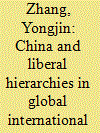

|
|
|
|
|
| Contents |
This article investigates the entanglement of the rising Chinese power with the liberal global order in negotiating for normative change. Drawing upon the English School theoretical perspective, it argues that three hierarchical constructs of liberal persuasion co-exist in and cohabit the global international society today. They are, namely, the legalized hegemony as seen in the UN Charter-based liberal pluralism; the changing normative order of emerging solidarist and anti-pluralist formation that purposively creates unequal sovereigns; and the liberal global governance order that moves predominantly in the direction of state-centric solidarism. As an emerging power with an authoritarian regime, China's entanglement with these liberal hierarchical constructs is multifaceted with complex dynamics. The article argues specifically that three differentiated strategic approaches have been developed by China in this entanglement: to defend liberal pluralism in the legalized hegemony; to contest liberal cosmopolitan anti-pluralism in the changing normative order; and to endorse state-centric solidarism with regard to the construction of a liberal global governance order. If they reflect a rising China's preferences of order construction, they also constitute an important part of China's engaging negotiations for normative change in international society. The agency China exercises in this regard helps explain the limited consensus among Great Powers as to the ‘central direction’ for the evolving global order. The preferences of China as the second among equals in the Great Power club matter greatly in understanding the contention between pluralism and solidarism in the changing raison de système of contemporary global international society.
|
|
|
|
|
|
|
|
|
|
|
|
|
|
|
|
| 2 |
ID:
152663
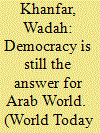

|
|
|
| 3 |
ID:
132508
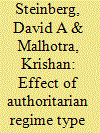

|
|
|
|
|
| Publication |
2014.
|
| Summary/Abstract |
Conventional wisdom holds that autocracies are more likely than democracies to adopt interventionist and protectionist economic policies, including fixed and undervalued exchange rates. This article suggests that this view is only partially correct: nondemocracies are a heterogeneous grouping, and only some types of authoritarian regimes adopt different foreign economic policies from those of their democratic counterparts. Using the example of exchange rate policy, the authors show that foreign economic policy varies across monarchic, military, and civilian dictatorships. More specifically, they hypothesize that monarchies and military regimes are more likely than democracies and civilian dictatorships to maintain fixed exchange rate regimes because the former regimes have smaller "selectorates" than the latter. The authors also expect that monarchies and civilian dictatorships maintain more undervalued exchange rates than democracies and military regimes because the former regimes provide their leaders with greater tenure security than the latter regimes. These hypotheses are evaluated using a time-series-cross-sectional data set of a large sample of developing countries from 1973 to 2006. The statistical results accord with these predictions. These findings indicate that the ways in which democracies engage with the global economy may be less unique than many believe.
|
|
|
|
|
|
|
|
|
|
|
|
|
|
|
|
| 4 |
ID:
191594
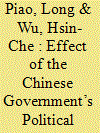

|
|
|
|
|
| Summary/Abstract |
While China has been experiencing rapid economic growth, its conflicts with the United States have become more public. In particular, the argument that the Chinese government can easily gain public support in establishing and promoting national policies under its authoritarian regime has been on the rise. With this background, this study conducts an empirical analysis of data from 4,366 survey respondents using ordinary least squares and ordered logit models to analyze the effect of the Chinese government’s political propaganda and individual characteristics on anti-US sentiment. The results suggest that this propaganda strengthens anti-US sentiment. As for individual characteristics, party officials have stronger anti-US sentiment. Moreover, interacting exposure to political propaganda with the main variables suggests that members of the Communist Party of China, national minorities, and rural residents have stronger anti-US sentiment, presumably because they are more influenced by political propaganda.
|
|
|
|
|
|
|
|
|
|
|
|
|
|
|
|
| 5 |
ID:
126629
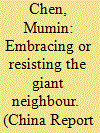

|
|
|
|
|
| Publication |
2013.
|
| Summary/Abstract |
Since 2008, President Ma Ying-jeou and his Kuomintang (KMT) government in Taiwan have adopted the policy of seeking greater economic cooperation with China in exchange of reducing confrontation across the Taiwan Strait. By endorsing the 'One China' principle, the KMT government successfully resumed dialogue with Beijing and signed 18 agreements, ranging from allowing Chinese tourists to visit Taiwan to establishing a closer economic partnership. Yet President Ma's self-claimed achievements in cross-strait peace received severe criticisms from the opposition Democratic Progressive Party (DPP), which accused KMT's pro-China policy as selling out the democratic Taiwan to an authoritarian regime. This article examines the on-going debates between the ruling KMT and opposition DPP about proper strategies towards China, and how such debates make it unlikely for Taiwan to form an effective policy on cross-strait affairs. The differences between KMT and DPP on their respective China policies have led to prolonged distrust between both parties, and between DPP and Beijing. Facing an increasingly powerful China, both parties are short of better ideas to convince voters that their current policy will effectively secure Taiwan's sovereign status or will be beneficial to enhancing Taiwan's interests in the long term.
|
|
|
|
|
|
|
|
|
|
|
|
|
|
|
|
| 6 |
ID:
131564


|
|
|
|
|
| Publication |
2014.
|
| Summary/Abstract |
This article reads Bashar al-Asad's rule through the prism of social activism and, in particular, through the field of charities. The sociopolitical transformations Syria experienced between 2000 and 2010-the shift in state-society relations, the opening of the civic arena, and economic liberalization-are explored through the activities of charitable associations, including their interactions with other Syrian actors, and we argue that they reflect the unraveling of the old social contract. The Syrian leadership outsourced important state welfare functions to charities while also creating nongovernmental organizations (NGOs) under its own control and supporting developmental NGOs loyal to the regime. These NGOs differed from the existing charities in terms of their social base, financial backgrounds, motivations, modes of institutionalization, and public relations strategies, and enabled the authoritarian regime to pursue a new strategy of divide-and-rule politics. At the same time, subcontracting poor-relief measures to charities eroded the regime's political legitimacy and helped sow the seeds of the 2011 uprising.
|
|
|
|
|
|
|
|
|
|
|
|
|
|
|
|
| 7 |
ID:
132957
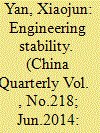

|
|
|
|
|
| Publication |
2014.
|
| Summary/Abstract |
Given their critical influence on society and politics, university students are one of the key target groups for authoritarian political control around the world. To further our understanding of the endurance and resilience of authoritarianism in post-Deng China, it is necessary to examine one of the Party-state's most crucial control frameworks: the institutional mechanism through which it preserves social stability in the nation's 2,358 university campuses, and maintains control over its more than 22 million college students. Drawing upon intensive field research conducted in 2011, this article attempts to map out the structures and measures deployed by the post-Deng regime to nurture political compliance and consolidate its domination of university campuses. By deciphering an essential component of the state's political control apparatus, this article aims to shed new light on the internal operations of the authoritarian system that is running China today.
|
|
|
|
|
|
|
|
|
|
|
|
|
|
|
|
| 8 |
ID:
137238
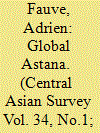

|
|
|
|
|
| Summary/Abstract |
This paper examines how, in post-Soviet Kazakhstan, both channels of elite and banal nationalism (such as sports and higher education) serve as instruments to promote the country. Through these channels, Kazakhstan is portrayed as an open, dynamic and successful country, an image which is in serious disjuncture with the authoritarian nature of the regime. Taking advantage of massive oil revenues, the government organized a significant OSCE general conference in 2010, while chairing the institution. In addition, it created the Astana professional cycling team, which rapidly became a world leader in the sport. Last but not least, Nazarbayev University, attracting prominent Western scholars, is now designed to make the country compete in the international arena of academic rankings. Domestic and international performances are thus treated as instruments to promote the legitimacy of the state at national and global levels. But this would not be possible without the help of individual actors who actively participate in this process. A close investigation shows that their social capital is based on global connections in various spheres (sports, finance and academia). This paper draws on evidence gathered through qualitative methods of enquiry (participant observation and semi-structured interviews). Finally, Astana is treated as a Latourian actor-network that has its own life and agency, thanks to the global association of various human actors and material objects.
|
|
|
|
|
|
|
|
|
|
|
|
|
|
|
|
| 9 |
ID:
147606
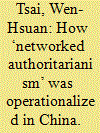

|
|
|
|
|
| Summary/Abstract |
Does network technology weaken the ability of authoritarian regimes to govern their citizens? Arguments and discussion regarding this proposition can be found in existing studies. Scholars who support this point of view believe that certain developments in network technology led to the outbreak of the Jasmine Revolution in Arab countries in 2011. This chain of rebellions provides an obvious and affirmative example of this theory. However, as far as Chinese research is concerned, an ever-increasing number of scholars are of the opinion that the Chinese Communist Party (CCP) has gradually mastered control of network technology. They believe the CCP actually employs the technology to strengthen its ability to govern Chinese society. This article discusses the CCP’s techniques of public opinion control in the context of new technology networks, and points out that the CCP has manifested the essence of a networked authoritarian regime, thus achieving the purpose of authoritarian consolidation.
|
|
|
|
|
|
|
|
|
|
|
|
|
|
|
|
| 10 |
ID:
128521


|
|
|
|
|
| Publication |
2013.
|
| Summary/Abstract |
Asia is the most populous and rapidly urbanizing region in the world today and features 23 of the world's 40 biggest metropolitan areas. In many Asian countries, accelerated economic development, industrialization and urbanization have been accompanied by a growing acceptance that decentralization (the devolution of central state powers, responsibilities and resources to the sub-national scale)4 can lead to more effective and responsive governance in state, provincial, city and regency jurisdictions. This trend toward decentralized governance in Asia has often, but not always, been precipitated by a transition away from authoritarian regimes to more democratic forms of governance. Discourses about the desirability of democratic decentralization have typically emphasized the devolution of central state authority as the preferred means by which to empower communities and to increase the voice and participation of ordinary citizens in governmental decision-making processes that affect their lives and livelihoods. Thus, decentralization policies in urbanizing Asia have aimed to encourage the active involvement of urban residents in addressing shared dilemmas concerning issues such as environmental sustainability, public service delivery, community building and socio-political stability in often densely concentrated and ethnically diverse populations. At the same time, however, decentralization within the contexts of globalization and privatization may circumvent critical aspects of democratic procedure if sub-national government officials use their increased access to state power and resources to nurture clientelistic networks of patronage and/or to tap into wider circles of regional or global economic activity at the expense of local urban development.
|
|
|
|
|
|
|
|
|
|
|
|
|
|
|
|
| 11 |
ID:
144378
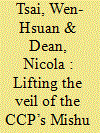

|
|
|
|
|
| Summary/Abstract |
This article analyzes the Chinese Communist Party’s opaque mishu (secretary) system. It consists of two branches: institutional mishu and personal mishu. The former are mainly employed in Party Committee general offices, to assist the Committee leadership and liaise between departments to push Committee policies and to administer and compile relevant documents to support the policy-making process. Personal mishu work instead in the individual leaders’ executive offices. Those working for members of the Politburo Standing Committee can be divided into four main categories: political, confidential, security and life mishu. Both institutional and personal mishu work essentially on behalf of CCP leaders at various levels. In addition to clarifying the formal arrangements of the mishu system, this article will also consider the system through the lens of unrestricted informal politics, discussing particularly how mishu are able to accumulate power through leverage of the client–patron relationship between themselves and their leading cadre.
|
|
|
|
|
|
|
|
|
|
|
|
|
|
|
|
| 12 |
ID:
182590
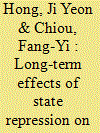

|
|
|
|
|
| Summary/Abstract |
This article examines how violence against citizens affects their political attitudes and behavior in the long run, and how those effects vary over time. We construct and analyze a novel dataset on the victims of Taiwan's February 28 Incident, in 1947, with survey data spanning 1990 to 2017. Our empirical analysis shows that cohorts having directly or indirectly experienced the Incident are less likely to support the Kuomintang Party (KMT), the former authoritarian ruling party responsible for the Incident. They tend to disagree with the key conventional policy stand of the KMT (unification with mainland China), are more likely to self-identify as Taiwanese, and are less likely to vote for KMT presidential candidates. Taiwan's residents who were born in towns with larger number of casualties during the Incident are more likely to reject unification. Finally, the effects are found to vary over the period following democratization.
|
|
|
|
|
|
|
|
|
|
|
|
|
|
|
|
| 13 |
ID:
175559
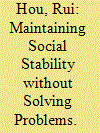

|
|
|
|
|
| Summary/Abstract |
What role do emotions play in state repression? Building upon ethnographic observation in one Beijing petition bureau, this paper explores the emotional labour performed by grassroots officials to demobilize social dissent. The petition system serves as an official channel through which the Chinese government receives complaints and grievances from citizens. Notwithstanding its institutional inefficiency in addressing petitioners’ requirements, this system plays a critical role in maintaining social stability. I investigate the process by which frontline petition officials manage petitions. I argue that channelling petitioners’ emotions has become one of these officials’ core functions. Petition officials have developed three types of emotional strategies – emotional defusing, emotional constraint and emotional reshaping – to absorb petitioners’ complaints. This study of emotional repression offers a fresh perspective on the affective dimension of contentious politics and also contributes to the theoretical discussion on how authoritarian regimes deal with dissent.
|
|
|
|
|
|
|
|
|
|
|
|
|
|
|
|
| 14 |
ID:
139264
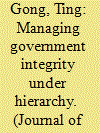

|
|
|
|
|
| Summary/Abstract |
In contrast to the early campaign style anti-corruption strategy based on nationwide uniformity, disparate local integrity initiatives and programs have proliferated in China in recent years. Local innovation in managing government integrity has been encouraged by the Center. Drawing on the author's fieldwork in Guangdong, this article investigates the rationale behind such development and addresses the question of why the central leadership has become receptive to local initiatives in cadre management, an area where political conformity was deemed necessary by an authoritarian regime. It suggests that the strategic adjustment testifies to the institutional failure of the earlier anti-corruption regime that manifested in, inter alia, an acute agency loss problem. The emerging approach to integrity management nevertheless has paradoxical institutional roots. It indicates some new thinking by the central authorities on holding local governments responsible for integrity management. Just as clearly, the adjustment is also driven by the Center's concern about losing control and its desire to ‘manage’ government integrity under hierarchy.
|
|
|
|
|
|
|
|
|
|
|
|
|
|
|
|
| 15 |
ID:
172855


|
|
|
|
|
| Summary/Abstract |
How can citizens living under increasingly militarized and authoritarian regimes exercise political voice? Using an in-depth case study of naked protest in modern day Uganda, this article finds that naked bodies allow citizens to employ three types of overlapping power to confront a militarized authoritarian state: biopower, symbolic power, and cosmological power. The study illustrates one way in which citizens seek to engage militarized regimes—and in doing so, how political voice takes particular forms with limited capacity to instigate broader political claim-making that might be associated with country- or region-wide political action.
|
|
|
|
|
|
|
|
|
|
|
|
|
|
|
|
| 16 |
ID:
137206
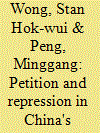

|
|
|
|
|
| Summary/Abstract |
China has established a petition system to elicit information about grievances. However, the petition system may have perverse effects because it also reveals to the center the failure of local-level officials to resolve those grievances. Anecdotal accounts suggest that local officials have incentive to silence petitioners, often with the use of repression. In this article we study whether non–regime threatening petitions would provoke local governments' coercive response. To tackle the endogenous relationship between petition and repression, we take advantage of a natural experiment afforded by a change in hydroelectricity policy in China. In particular, we use provincial hydropower outputs as an instrument to identify citizen petitions. We find that citizen petitions significantly increase a province's spending on its repressive apparatus. The results suggest a paradoxical outcome of China's petition system: while it may help reduce the national authority's use of repression, it has caused an explosion of repression within the authoritarian system as a whole.
|
|
|
|
|
|
|
|
|
|
|
|
|
|
|
|
| 17 |
ID:
119241
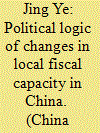

|
|
|
| 18 |
ID:
127485
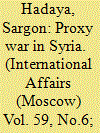

|
|
|
|
|
| Publication |
2013.
|
| Summary/Abstract |
THE REGIME of Bashar al-Assad in Syria has been demonstrating a relatively high level of tenacity amid the proxy war raging in the country for over two years now. Indeed, the authoritarian regime in Tunisia folded up in two weeks; the Mubarak regime in Egypt, in slightly over four weeks; the Colonel Qaddafi regime collapsed after six months of NATO strikes. Russian expert Prof. Edouard Ozhiganov has offered a methodologically exact comment: "Any political regime can be described as stable to the extent to which it can neutralize inside and outside pressure using its own resources and instruments.
|
|
|
|
|
|
|
|
|
|
|
|
|
|
|
|
| 19 |
ID:
149644
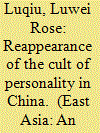

|
|
|
|
|
| Summary/Abstract |
Over the past 2 years, there have been signs that the Chinese Communist Party has activated the propaganda machine to build a cult of personality around the current leader: Xi Jinping. The campaign has global ambitions. This study analyzes Chinese state media news stories, music videos, and animation on social media to discuss the themes of rhetoric and ritual. Using firsthand observation along with a brief comparison of the Soviet Union system and the history of the Communist Party of China (CPC), this study provides details on how the CPC is attempting to produce a cult of personality and the constraints it faces in doing so. Understanding this process is important for understanding the CPC and predicting whether China will continue to experience personalized regimes in the future.
|
|
|
|
|
|
|
|
|
|
|
|
|
|
|
|
| 20 |
ID:
133951
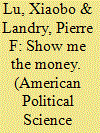

|
|
|
|
|
| Publication |
2014.
|
| Summary/Abstract |
We argue that interjurisdiction competition in authoritarian regimes engenders a specific logic for taxation. Promotion-seeking local officials are incentivized to signal loyalty and competence to their principals through tangible fiscal revenues. The greater the number of officials accountable to the same principal, the more intense political competition is, resulting in higher taxation; however, too many officials accountable to the same principal leads to lower taxation due to shirking by uncompetitive officials and the fear of political instability. Using a panel dataset of all Chinese county-level jurisdictions from 1999-2006, we find strong evidence for an inverse U-shaped relationship between the number of county-level jurisdictions within a prefecture-our proxy for the intensity of political competition-and fiscal revenues in most provinces but not so in politically unstable ethnic minority regions. The results are robust to various alternative specifications, including models that account for heterogeneous county characteristics and spatial interdependence.
|
|
|
|
|
|
|
|
|
|
|
|
|
|
|
|
|
|
|
|
|